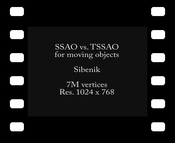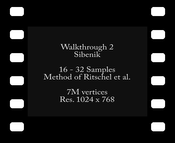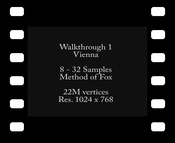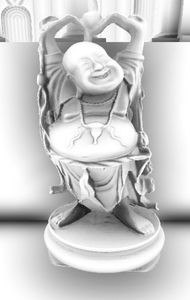Information
- Publication Type: Journal Paper (without talk)
- Workgroup(s)/Project(s):
- Date: December 2010
- ISSN: 0167-7055
- Journal: Computer Graphics Forum
- Number: 8
- Volume: 29
- Pages: 2492 – 2503
- Keywords: temporal coherence, ambient occlusion, real-time rendering
Abstract
Ambient occlusion is a cheap but effective approximation of global illumination. Recently, screen-space ambient occlusion (SSAO) methods, which sample the frame buffer as a discretization of the scene geometry, have become very popular for real-time rendering. We present temporal SSAO (TSSAO), a new algorithm which exploits temporal coherence to produce high-quality ambient occlusion in real time. Compared to conventional SSAO, our method reduces both noise as well as blurring artifacts due to strong spatial filtering, faithfully representing fine-grained geometric structures. Our algorithm caches and reuses previously computed SSAO samples, and adaptively applies more samples and spatial filtering only in regions that do not yet have enough information available from previous frames. The method works well for both static and dynamic scenes.Additional Files and Images
Additional images and videos
 image-buddha:
ssao
image-buddha:
ssao
 image-knight:
convergence
image-knight:
convergence
 video-movements:
dynamic
video-movements:
dynamic
 video-sibenik:
walkthrough
video-sibenik:
walkthrough
 video-vienna:
walkthrough
video-vienna:
walkthrough
Additional files
Weblinks
BibTeX
@article{mattausch-2010-tao,
title = "High-Quality Screen-Space Ambient Occlusion using Temporal
Coherence",
author = "Oliver Mattausch and Daniel Scherzer and Michael Wimmer",
year = "2010",
abstract = "Ambient occlusion is a cheap but effective approximation of
global illumination. Recently, screen-space ambient
occlusion (SSAO) methods, which sample the frame buffer as a
discretization of the scene geometry, have become very
popular for real-time rendering. We present temporal SSAO
(TSSAO), a new algorithm which exploits temporal coherence
to produce high-quality ambient occlusion in real time.
Compared to conventional SSAO, our method reduces both noise
as well as blurring artifacts due to strong spatial
filtering, faithfully representing fine-grained geometric
structures. Our algorithm caches and reuses previously
computed SSAO samples, and adaptively applies more samples
and spatial filtering only in regions that do not yet have
enough information available from previous frames. The
method works well for both static and dynamic scenes.",
month = dec,
issn = "0167-7055",
journal = "Computer Graphics Forum",
number = "8",
volume = "29",
pages = "2492--2503",
keywords = "temporal coherence, ambient occlusion, real-time rendering",
URL = "https://www.cg.tuwien.ac.at/research/publications/2010/mattausch-2010-tao/",
}

